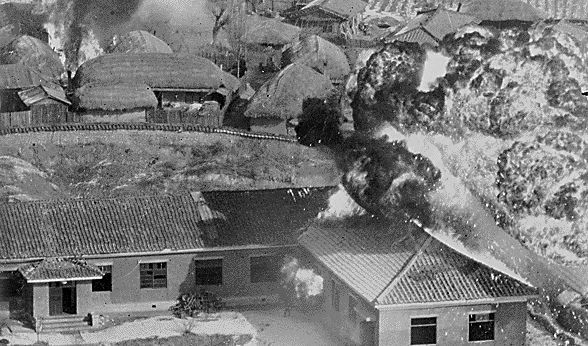
Winston Churchill’s Revulsion over Napalm Bombing
Excerpted from “Napalm: An Example of Churchill’s Disdain for Terror Weapons,” written for the Hillsdale College Churchill Project. For the original article and images, click here. To subscribe to weekly articles from Hillsdale-Churchill, click here, scroll to bottom, and fill in your email in the box entitled “Stay in touch with us.” Your email address is not given out and remains a riddle wrapped in a mystery inside an enigma.
Napalm et al.
Much nonsense has been published about Churchill’s supposed enthusiasm for chemical weapons. Compiling an expanded edition of my quotation book, Churchill by Himself, I ran across what he said about napalm. Unpublished until recently, it illustrates his true feelings. It complements what he said about “poison gas” 30 years earlier—repelled by its effect on civil populations.
Napalm or “sticky fire” is a deoxygenating compound that adheres to and burns on surfaces, creating a conflagration. It was first used during an attack on Berlin in March 1944. It was also widely deployed by the French in the First Indochina War (1946-54), and American forces in the Korean War (1950-53).
Napalm attacks did not often distinguish civilian from military targets. So reluctance over its use arose among the Western allies, particularly Great Britain. By summer 1952, the U.S. press was reporting serious Anglo-American differences over napalm.
“A very cruel form of warfare”
In August 1952, Prime Minister Winston Churchill decisively rejected the use of napalm where it might involve civilian populations:
I do not like this napalm bombing at all. A fearful lot of people must be burned, not by ordinary fire, but by the contents of the bomb. We should make a great mistake to commit ourselves to approval of a very cruel form of warfare affecting the civilian population. Napalm in the [Second World] War was devised by us and used by fighting men in action against tanks and against heavily defended structures. No one ever thought of splashing it about all over the civilian population. I will take no share in the responsibility for it. It is one thing to use Napalm in close battle of ground troops, or from the air in immediate aid of ground troops. It is quite another thing to torture great masses of unarmed people by it.
The statement about giving “due warning to civilians to evacuate,” etc., is not worth much. If people have to go to their work every day and live in their homes, they have not much choice of dwelling…. I do not see how Press articles and jabber of that kind compares with splashing about this burning fluid on the necks of humble people living where they have to.
“Lachrymatory” gas is not phosgene
Churchill was consistent regarding chemical weapons. The Germans introduced poisonous chlorine gas during the Second Battle of Ypres in April 1915. Outraged, the Allies retaliated in kind, but revulsion over its lethal effects was widespread.
After the war Churchill headed the War Office. The question arose of using non-lethal gas against rebel tribesmen in Northwest India and in Mesopotamia, now Iraq. It was never proposed to use chlorine or phosgene. But Churchill himself confused the matter when he used the term “poisoned gas” in a departmental minute:
It is sheer affectation to lacerate a man with the poisonous fragment of a bursting shell and to boggle at making his eyes water by means of lachrymatory gas. I am strongly in favour of using poisoned gas against uncivilised tribes. The moral effect should be so good that the loss of life should be reduced to a minimum. It is not necessary to use only the most deadly gasses: gasses can be used which cause great inconvenience and would spread a lively terror and yet would leave no serious permanent effects….
Ten days later, Churchill addressed the India Office’s reluctance to use “lachrymatory” (tear) gas against rebel tribesmen: “Gas is a more merciful weapon than high explosive shell, and compels an enemy to accept a decision with less loss of life than any other agency of war.”
Consistent abhorrence
Churchill supported the use of non-lethal “lachrymatory gas” for a sound reason: the welfare of soldiers. In all the accounts of his supposed enthusiasm for gas warfare, I have never seen this minute cited in full:
Having regard to the fact that [the India Office] are retaining all our men, even those who are most entitled to demobilisation, we cannot in any circumstances acquiesce in the non-utilisation of any weapons which are available to procure a speedy termination of the disorder which prevails on the frontier.
If it is fair war for an Afghan to shoot down a British soldier behind a rock and cut him in pieces as he lies wounded on the ground, why is it not fair for a British artilleryman to fire a shell which makes the said native sneeze? It is really too silly.
Virtually always absent from quotes alleging Churchill’s penchant for gas is the first paragraph above. It testifies that Churchill was thinking more broadly than most. He was thinking humanely, hoping to limit deaths by the most barbarous methods of warfare.






